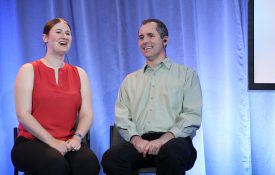-

Perspectives Invites Additional Articles for “Am I Famous Yet?” Symposium
The November 2016 issue of Perspectives on Psychological Science (PPS) includes the symposium “Am I Famous Yet?,” a series of invited articles discussing what factors ought to be taken into account in evaluating the scientific merit of
-

Improving the Reproducibility of Our Research Practices
APS presents a six-part workshop with APS Fellow Brian Nosek, University of Virginia and Executive Director, Center for Open Science (COS), and Courtney Soderberg, COS Statistical and Methodological Consultant.
-

Major Change in NIH Policy for Clinical Trials Applications
In a significant departure from current practices, NIH has issued new policies relating to grant applications involving clinical trials, including one mandating that all applications involving clinical trials must be in response to a funding opportunity designed for clinical trials.
-

Mental Flexibility May Buffer Against Emotional Stress
Brain imaging research suggests that our ability to do “cold” math calculations may be connected with our ability to regulate “hot” emotions.
-
Studying Perception of Animate Versus Inanimate Objects With LEGO Blocks
Animate objects, such as animals and humans, hold a special sway over humans’ attention. For example, when presented with two scenes (one containing an animal and one not), people will preferentially orient to the one containing the animal. People are also faster and more accurate at detecting change in animate objects compared with inanimate objects The privileged attention of animate objects compared with inanimate objects makes sense from an evolutionary viewpoint, as it has historically been — and continues to be — important to quickly determine if one is seeing a friend or foe, a predator or prey. In a 2016 study, Mitchell R. P.
-

Two Priming Effects to Be Examined in New Registered Replication Reports With Combined Protocol
APS is excited to announce two new Registered Replication Report (RRR) projects. These reports will be published in APS’s new journal, Advances in Methodologies and Practices in Psychological Science

